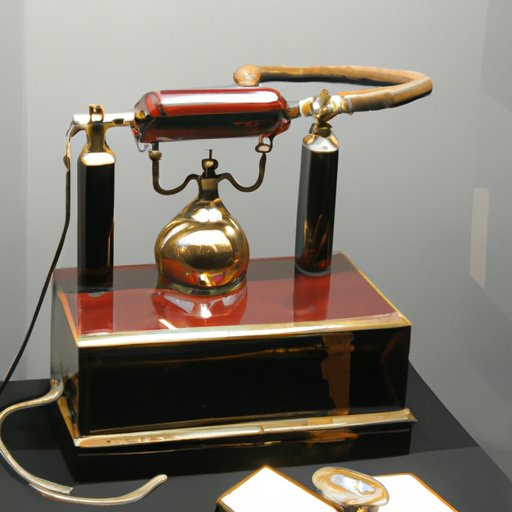Introduction
The telephone is one of the most revolutionary inventions of modern times. First developed in 1876 by Alexander Graham Bell, the telephone has changed the way we communicate and do business. But what inspired the invention of the telephone? This article will explore the history of the telephone, the inventors behind it, and its impact on society, technology, and business.

History of the Telephone: How it Came to Be
The telephone was first invented in 1876 by Alexander Graham Bell and Elisha Gray. Both inventors were working independently on similar devices when Bell applied for a patent just hours before Gray. Although both inventors had been working on similar devices, Bell was responsible for developing the first successful telephone.
Bell’s invention was heavily influenced by the telegraph, which had been developed several decades earlier. The telegraph allowed messages to be sent electronically over long distances, making it much faster than traditional methods of communication such as mail or messenger services. The telephone was an improvement on the telegraph because it allowed for two-way communication, allowing people to speak to each other over long distances.
Bell and Gray’s invention was not the first attempt at creating a telephone. Italian inventor Antonio Meucci had previously filed a caveat for a device he called a “teletrofono” in 1871. Unfortunately, Meucci was unable to secure a patent for his invention due to financial difficulties.
Exploring the Impact of the Telephone on Society
The invention of the telephone had a profound impact on society. It allowed for instantaneous communication between people over long distances, revolutionizing the way we communicate. According to the American Association of Retired Persons (AARP), the telephone “changed the way people communicated with each other, revolutionizing the way they did business, conducted their social lives, and even organized their families.”
The invention of the telephone also opened up new business opportunities. Companies could now communicate with customers and suppliers quickly and efficiently, leading to increased productivity and efficiency. Additionally, businesses could now reach out to a wider customer base, allowing them to expand into new markets.
The telephone also changed social norms and behavior. People no longer had to wait days or weeks for a response to a letter; they could now communicate with each other instantly. This led to changes in the way people interacted with each other, as well as how they conducted their social lives.

Examining the Inventors Behind the Telephone
Alexander Graham Bell is widely credited as the inventor of the telephone. Born in Scotland in 1847, Bell was a scientist and inventor who moved to the United States in 1870. He developed the first successful telephone in 1876, which was patented shortly thereafter.
Elisha Gray was another inventor who had been working on a similar device at the same time as Bell. Gray had been working on a harmonic telegraph, which was a device that used multiple frequencies to send messages over long distances. Although Gray was unable to secure a patent for his device, he is still recognized as an important contributor to the development of the telephone.
Antonio Meucci is also credited as an early innovator in the development of the telephone. Meucci had filed a caveat for a device he called a “teletrofono” in 1871, but was unable to secure a patent due to financial difficulties. Although his invention predates Bell’s and Gray’s, it was never fully developed and thus does not hold the same significance as Bell’s invention.
The Role of Technology in the Invention of the Telephone
Technology played an important role in the invention of the telephone. Early telephones relied on analog signals, which are electrical signals that vary in strength and frequency. However, the introduction of digital technology in the 1980s allowed for more efficient transmission of data and improved sound quality.
In addition, advances in telecommunications technology have allowed for the development of new devices such as cell phones and VoIP phones. These devices allow for easier and more efficient communication, making it possible to stay connected with friends and family no matter where they are.
Analyzing the Business Benefits of the Telephone
The invention of the telephone had a major impact on businesses. The ability to communicate quickly and easily over long distances allowed companies to increase productivity and efficiency. Companies could now communicate with customers and suppliers more quickly, leading to reduced costs and increased profits.
The telephone also improved customer service, as customers could now contact companies directly with questions or concerns. Additionally, businesses could now collaborate more easily with partners and colleagues around the world, which allowed them to access new markets and take advantage of global opportunities.

Investigating the Cultural Significance of the Telephone
The invention of the telephone had a major impact on culture. It gave rise to the “telephone culture”, in which people would spend hours chatting on the phone with friends and family. It also allowed for the expansion of family networks, as people could now keep in touch with relatives living far away.
The invention of the telephone also ushered in the “information age”, in which people had access to vast amounts of information at their fingertips. This made it easier for people to stay informed about current events, as well as to access knowledge from around the world.
Conclusion
The invention of the telephone was a revolutionary event in human history. It changed the way people communicated, did business, and interacted with each other. By exploring the history of the telephone and the inventors behind it, as well as its impact on technology, business, and culture, this article has explored why the telephone was invented.
The telephone has had a major impact on society and continues to shape the way we communicate today. With its invention, Alexander Graham Bell, Elisha Gray, and Antonio Meucci have left a lasting legacy that will continue to influence our lives for generations to come.
(Note: Is this article not meeting your expectations? Do you have knowledge or insights to share? Unlock new opportunities and expand your reach by joining our authors team. Click Registration to join us and share your expertise with our readers.)
